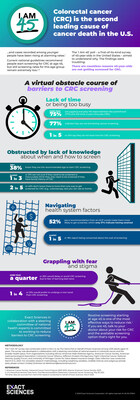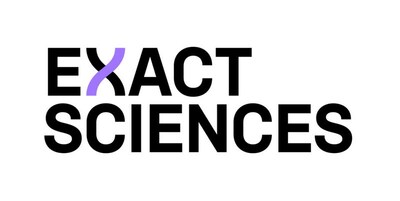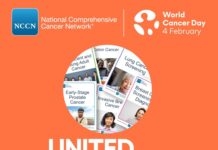First-of-its-kind research from the “I Am 45” poll explores why 45-year-olds are not getting screened for deadly colorectal cancer despite national screening guidelines1,2
From lack of time to lack of health insurance, low awareness and fears of learning bad news: barriers are as unique and varied as the regions and demographics of the U.S.3
Steering committee of national health experts commits to leveraging the research insights to help improve screening rates
MADISON, Wis., Aug. 21, 2023 /PRNewswire-HISPANIC PR WIRE/ — With an alarming rise in colorectal cancer (CRC) among younger people, new research shines light on the beliefs, behaviors and barriers standing in the way of 45-year-olds in the United States completing potentially lifesaving CRC screenings.2,3 Exact Sciences, a leading provider of cancer screening and diagnostic tests, convened a steering committee of national experts to design and field the “I Am 45” poll, the most robust survey ever of 45-year-olds in the United States about cancer screening (n=1,005).

“Colorectal cancer is one of the deadliest, but also one of the most preventable cancers, and routine screening starting at age 45 using one of several guideline-recommended methods is the most effective way to reduce risk of dying from this disease,” said Cynthia M. Yoshida, MD, a gastroenterologist at the University of Virginia Medical Center and medical lead of the UVA Comprehensive Cancer Center’s Colorectal Cancer Screening Program. “Despite this, we see many people in this critical age group not getting screened, and this research provides an important but troubling window into why, revealing not just one, but a multitude of barriers – a virtual obstacle course to lifesaving colorectal cancer screening.”
Findings revealed that there are countless reasons why 45-year-olds are not getting screened:3
- Lack of time due to everyday life responsibilities
- Lack of awareness about CRC risk factors as well as when and how to screen for CRC
- Fear and stigma
- Lack of recommendation from a healthcare provider (HCP)
- Lack of health insurance
- Prioritization of other areas of health
- Feeling young and in good health
In partnership with The Harris Poll, the nationwide study questioned more than 1,000 45-year-olds – the national guideline-recommended age to start screening for colorectal cancer1 – on a number of topics that impact their mindset and behaviors around health, and more specifically, CRC screening. Three out of four (76%) 45-year-olds indicated that there was at least one reason they would delay or avoid CRC screening, possibly explaining why many have not been screened and suggesting the few who did report being screened by colonoscopy (21%) and/or a test that could be used at home (14%) may have had to navigate these challenges to do so.3
It is estimated that nationwide implementation of an 80% colorectal cancer screening prevalence for all eligible adults could save tens of thousands of lives by preventing numerous cases and deaths.4 For individuals younger than 50, colorectal cancer incidence rates and later-stage diagnoses are rising at alarming rates. In 2023, an estimated 19,550 individuals under 50 will be diagnosed with colorectal cancer, and 3,750 will die from this cancer.2,4 This disease disproportionately affects different socioeconomic groups, races and regions in the United States, with higher rates being observed in certain communities such as Black and American Indian or Alaska Native communities.2,4
“The ‘I Am 45’ poll helps us understand colorectal cancer screening disparities as well as the lack of awareness due to the multitude of barriers across the most at-risk populations, and importantly on a more relational and culturally competent level,” said Natalie Donnally, Vice President, African American Male Wellness Agency.
By design, the poll segmented the data across gender, race and region, providing insights to inform tailored solutions that can help address barriers unique to different communities, and ultimately impact low screening rates for colorectal cancer.
Key findings from the “I Am 45” poll identified the following barriers to CRC screening:3
- Lack of time due to everyday life responsibilities:
Today’s 45-year-olds are busy – many are parents or legal guardians (77%), work full-time or part-time jobs (79%) and are juggling other everyday life responsibilities that may sometimes take priority over concerns about their health. - Lack of awareness of CRC risk factors as well as when and how to screen for CRC:
Only 38% of 45-year-olds know they are of the recommended age to start routine screening for CRC – this figure drops to just 27% among Black Americans. Additionally, almost one in three (31%) 45-year-olds are not at all sure or inaccurately think they only need to be screened for colorectal cancer if they have a family history of the disease. Notably, Hispanic Americans are more likely to delay or avoid colorectal cancer screening because they do not know how to get screened (20%) compared to white or Black Americans (10% and 5%, respectively). - Fear and stigma:
More than a quarter (26%) of 45-year-olds would delay or avoid screening for colorectal cancer because they are afraid of learning bad news about their health, while 24% report they are uncomfortable with the process of some screening methods, such as a potentially invasive procedure. When given the choice between getting a colorectal cancer screening or undergoing a root canal, a procedure commonly known to be painful, one in four (25%) would prefer to undergo a root canal. - Lack of health insurance:
Nearly one in 10 (9%) 45-year-olds say they would delay or avoid screening for colorectal cancer because they do not have health insurance coverage, with the number increasing to 17% among Hispanic Americans and 14% of those living in rural areas. Additionally, 18% of 45-year-olds report being concerned about the cost associated with screening. 60% of those without health insurance say they have no plans to get screened for colorectal cancer, and more than two in five Hispanic Americans (43%) and those living in small towns (45%) say health insurance coverage would make them more likely to get screened. - Lack of recommendation from a healthcare provider (HCP):
45-year-olds value a recommendation from an HCP, indicating it as the top driver (52%) that would make them more likely to get screened for colorectal cancer, but fewer than two in five (37%) say their HCP has told them to get screened. This number drops to 24% among those living in rural areas. - Prioritization of other areas of health:
45-year-olds rank their top three health priorities as: physical fitness/exercise (51%); mental health (50%) and heart health (40%), with Black Americans more likely to prioritize self-care and spiritual health (37% compared to 21% of white Americans and 22% of Hispanic Americans). When considering cancer screenings, the majority of women (57%) believe it is or might be more important for women to be screened for breast cancer than colorectal cancer. - Feeling young and in good health:
The majority of 45-year-olds (67%) consider themselves to be “young.” 68% rate their overall health as excellent or good, and most (69%) say they are in better health than their parents were at their age, suggesting their health and preventive cancer screenings may not be top of mind.
The steering committee that designed the “I Am 45” poll is committed to working to address these potential barriers to improve CRC screening rates and urges 45-year-old Americans to talk with their healthcare providers about selecting and completing the CRC screening test most appropriate for them. The committee will utilize the learnings from the survey to build and enhance programs intended to increase screening for colorectal cancer.
“In convening this steering committee and commissioning the ‘I Am 45’ poll, it was our goal to uncover opportunities to identify key barriers to timely, regular colorectal cancer screening to better meet the needs of this younger population,” said Paul Limburg, Chief Medical Officer, Screening at Exact Sciences. “From this research, we learned that one in three (33%) 45-year-olds do not currently realize that screening can prevent colorectal cancer in some patients, showing that more work is needed to raise awareness and motivate action. We are committed to continuing education efforts to address this knowledge gap and working with our steering committee members to find creative solutions for increasing screening engagement for eligible patients who are under age 50.”
About the “I Am 45” Poll
The “I Am 45” poll was conducted online in the United States by The Harris Poll on behalf of Exact Sciences among 1,005 adults aged 45 years. Data collection was conducted March 6-14, 2023. For complete research methodology, including weighting variables, credible interval and subgroup sample sizes, please contact Lindsey Dickinson at [email protected].
About the “I Am 45” Steering Committee
The steering committee that designed the “I Am 45” poll is comprised of national experts in colorectal cancer and the broader health space to provide expert insight into areas of exploration for the survey. The members of this committee include executives and thought leaders from the following organizations: African American Male Wellness Agency, American Cancer Society, American Gastroenterological Association, Colorectal Cancer Alliance, Jefferson Einstein Montgomery, Fight Colorectal Cancer, National Minority Quality Forum and the University of Michigan Center for Value-Based Insurance Design.
About Exact Sciences Corp.
A leading provider of cancer screening and diagnostic tests, Exact Sciences gives patients and health care professionals the clarity needed to take life-changing action earlier. Building on the success of the Cologuard® and Oncotype® tests, Exact Sciences is investing in its pipeline to develop innovative solutions for use before, during, and after a cancer diagnosis. For more information, visit ExactSciences.com, follow Exact Sciences on Twitter @ExactSciences, or find Exact Sciences on LinkedIn and Facebook.
References:
- U.S. Preventive Services Task Force. Final Recommendation Statement: Colorectal Cancer: Screening. May 18, 2021.
- American Cancer Society. Colorectal Cancer Facts & Figures 2023-2025. Atlanta: American Cancer Society; 2023.
- Data from Harris Poll research conducted on behalf of Exact Sciences. March 2023.
- Siegel RL, Wagle NS, Cercek A, et al. Colorectal cancer statistics, 2023. CA: Cancer J Clin. 2023; 73(1):17-48.
Media (U.S.):
Lindsey Dickinson
+1 608-690-0383
[email protected]
Investor Contact:
Megan Jones
+1 608-535-8815
[email protected]

Photo – https://mma.prnewswire.com/media/2189447/IAm45_English_Final.jpg
Logo – https://mma.prnewswire.com/media/2078872/EXACT_SCIENCES_CORP__1.jpg
SOURCE EXACT SCIENCES CORP





